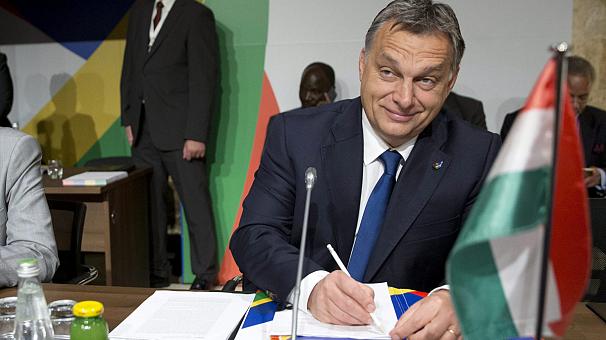Mentioning what he describes as “left-wing studies about the future of the EU and a possible European superstate”, Mr Orban subscribes to the view that the nation-state as a concept is being eroded and says the European Left and “radical American Democrats” have come up with a theory for this ˝new world˝ idea. He has no doubt that this is connected to the issue of migration.
Viktor Orban, whose political party has just launched a campaign for signatures against the European Union’s quota system intended to redistribute migrants, points out that according to all indirect evidence and experience the vast majority of the future migrants who fully integrate will be left-wing voters. “Consequently, future left-wing voters are being imported into Europe” he explains.
Orbán thinks that Germany is the key to the migrant crisis, but Angela Merkel’s hands are tied as she is in a coalition government with the Social Democrats.
The other key country Orbán names is Greece. He thinks it strange that the EU has accepted that Greece has not closed its borders. “If the Greeks observed the Schengen regulations, we would not have a problem”, he says, adding that if they are not able to protect European borders, then the EU should take measures to help them to do so. If this cannot be enforced, the union needs a second line of defense, but gave no further details.
Orbán talks about freedom of speech and expression in Europe, claiming that the “the free and sincere exchange of opinions is less and less a part of the culture of the European political elite.” He says that “what dominates European public speech today is simply European liberal chatter about nice but secondary topics of lesser significance”.
Among other things he thinks that Europe fails to talk about; “freedom… Christianity…nation and pride in European public speeches”, which he thinks are fundamental issues. Instead of this, Europe’s ‘elite’ only discusses superficial, secondary issues such as: Human rights, progress, peace, openness and tolerance.
Mr Orbán thinks the migrant crisis could destabilise the EU because commitment to democracy would be called into question. He says this could lead to serious problems if and when people realise that no one is listening to them, that their opinion does not count for anything on an issue which will decide their lives over the next few decades. He adds; “We must involve the people in the debates.”
A very similar argument was recently presented by the American ambassador to Hungary, Colleen Bell, concerning the state of checks and balances and democratic institutions in Hungary. She said increasing the centralisation of power leads to a situation where big decisions (that will have an impact on the country for generations) could be taken without any possibility for the people affected to share their opinion and views about them.
More about:
















































